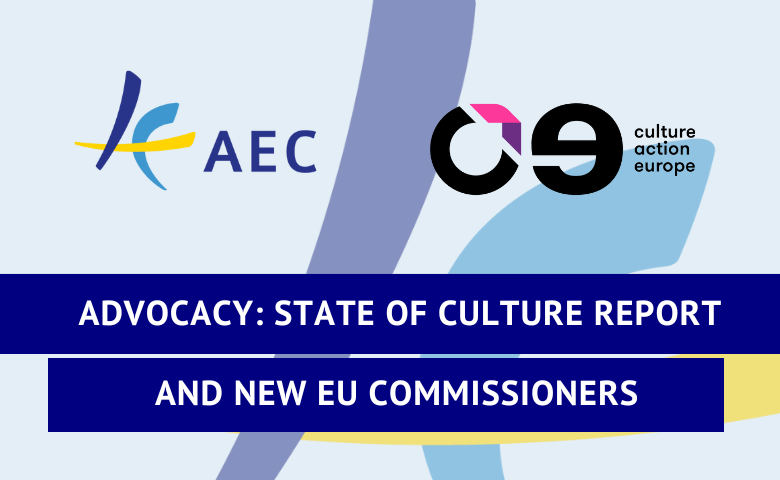The State of Culture report
Culture Action Europe’s (CAE’s) new State of Culture report holds up a mirror in front of the cultural sector and encourages us all to consider key questions about how culture can place itself at the heart of our society, policy development and the major transformations towards a better society.
This report was written by the independent researcher Elena Polivtseva on behalf of CAE and is based on a comprehensive analysis of, national cultural policy, EU cultural policy and over 570 interviews with cultural actors across Europe. It paints a picture of a sector which feels being pushed around by political agendas that have nothing to do with culture or education, and which demonstrates a political distrust that culture and education can seriously contribute to solving society’s major cross-cutting challenges.
Is there a risk that in our efforts to politely and submissively speak the politicians’ language and produce statistics that document that we are worth investing taxpayers’ money in, we forget that it is through culture and education that we create new images of the future as a basis for participation in the social debate and the democratic processes? Is there a risk that we inflict a new form of self-censorship on ourselves?
The AEC encourages anyone with an interest in advocacy and policy-making to discuss the report’s reflection of the sector in relevant forums. At the same time, we in the AEC Office are considering how we can best bring together opinions, views and ideas on behalf of the membership and return to Culture Action Europe and our continued efforts to put culture and education at the top of the European agenda.
[Culture Action Europe is the major European network of cultural networks, organisations, artists, cultural workers, activists, academics and policymakers. AEC is a member of CAE and works closely with the organisation on advocacy initiatives within art education and artistic research].
These three commissioners will influence higher music education
In these times, when we see polarisation, geopolitical conflicts, and states closing in on themselves, it is imperative that culture and education can continue to flow freely across Europe and contribute to dialogue and understanding against the backdrop of our common European cultural heritage. Only in this way can we find solutions to the challenges, which have such a scope that we cannot solve them individually, but in collaboration.
The EU elections this summer gave us a new EU Parliament, and at the same time, Commission President Ursula von der Leyen has presented a proposal for the new Commissioners who will form the new EU Commission. In the coming weeks, the commissioners-designate must be approved by the EU Parliament at a series of hearings before they can begin their work. The hearings will take place in the coming weeks and the AEC will of course follow the hearings and the statements on our area that the commissioners-designate present.
Until now, culture and education have been the responsibility of EU Commissioner Iljana Ivanova from Bulgaria. But from now on, our area will be divided into three different commissioners. The consequences of this are not yet clear, as we do not know how it will affect the tasks of the current directorate and its officials.
Here is the overview of the three commissioners-designate who will be responsible for culture, education and research respectively:
- Glenn Micallef, Malta, Commissioner-designate for Intergenerational Fairness, Youth, Culture and Sport
- Roxana Mînzatu, Romania, Commissioner-designate for People, Skills and Preparedness
- Ekaterina Zaharieva, Bulgaria, Commissioner-designate for Startups, Research and Innovation
Together with its partners, the AEC will focus on commissioners and their staff working together on the agendas important to culture and education so that our sector can continue to thrive and develop.
EU budget 2025 is to be negotiated during the coming weeks
In September, the Council of Europe proposed a reduction of the Erasmus+ and the Horizon Europe programmes for 2025 by almost 700 million Euros. Last week, the EU Parliament voted on its position on the budget, bringing allocations back to the levels originally suggested by the Commission. The vote initiates three weeks of “conciliation” talks with the Council, with the aim of reaching a deal for next year’s budget, which then has to be voted on by Parliament and signed by its President.
Did you know?
Over 90% of the EU budget funds activities in EU countries and beyond, benefiting citizens, regions, farmers, researchers, students, NGOs, and businesses. Unlike national budgets, the EU budget is primarily aimed at investment, to generate growth and opportunities across the European Union.
The EU serves 27 countries with a total population of 450 million. With these figures in mind, the annual EU budget is actually relatively small – on average €160-180 billion annually in 2021-27. This is comparable to the national budget of Denmark, which serves 5.6 million people, and is about 30% smaller than the budget of Poland, which serves 38 million people.






